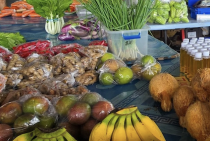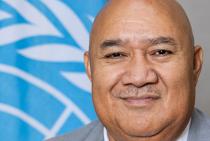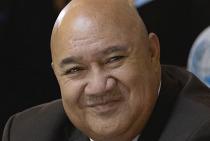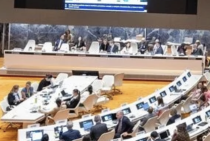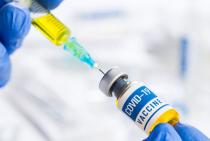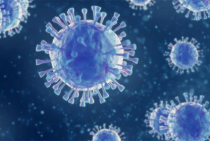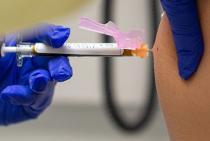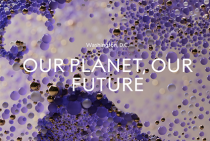Up to four in ten cancer cases worldwide could be prevented, according to a new global analysis from the World Health Organization (WHO) and its International Agency for Research on Cancer (IARC). The study examines 30 preventable causes, including tobacco, alcohol, high body mass index, physical inactivity, air pollution, ultraviolet radiation – and for the first time – nine cancer-causing infections. Three cancer types – lung, stomach and cervical cancer – accounted for nearly half of all preventable cancer cases in both men and women, globally.
You are here
Results for Op-Ed Global Health
Wednesday 4 February 2026
Geneva, Switzerland
Thursday 29 January 2026
Geneva, Switzerland
Healthy food in schools can help children develop healthy dietary habits for life, according to the World Health Organization (WHO), which released a new global guideline on evidence-based policies and interventions to create healthy school food environments. For the first time, WHO is advising countries to adopt a whole-school approach that ensures food and beverages provided in schools and available throughout the broader school food environments are healthy and nutritious. In 2025, about 1 in 10 school-aged children and adolescents – 188 million – were living with obesity worldwide, surpassing for the first time the number of children who are underweight.
Tuesday 18 November 2025
Manila, Philippines
As a doctor and surgeon in Tonga, I visited provincial hospitals and saw patients battling infections that no longer responded to the medicines we relied on. I remember a young child brought in with sepsis. We tried every antibiotic available, but nothing worked. Unfortunately, the child did not survive. That moment has stayed with me as a constant reminder that antimicrobials are precious, fragile tools in a physician’s arsenal - tools we are in danger of losing. The pandemic of antimicrobial resistance – or AMR - isn’t a science-fiction scenario. In many ways, it’s already here. - by Dr Saia Ma’u Piukala.
Monday 17 November 2025
Geneva, Switzerland
November 17 marked the first World Cervical Cancer Elimination Day – mandated by the World Health Assembly – a historic milestone in global efforts to end a preventable cancer. This day of action...highlights a critical opportunity: cervical cancer – the fourth most common cancer in women – claims over 350 000 lives each year, yet it is a disease that we have the tools to eliminate. -WHO
Saturday 4 October 2025
Jerusalem
Nearly 42,000 people in the Gaza Strip have life-changing injuries caused by the ongoing conflict, according to the latest WHO estimates released this week. One in four of these injuries are in children. The report also highlights the prevalence of complex facial and eye injuries as a result of severe trauma.
Monday 29 September 2025
Nuku'alofa, Tonga
Most people with hypertension feel fine, until they don’t. A stroke that robs someone of speech, a heart attack on the job, or kidney failure seemingly without warning. These are among the hidden dangers of hypertension, currently affecting more than one in four adults in the Western Pacific, a region of 38 countries and areas with over 2.2 billion people. On World Heart Day today, WHO is highlighting hypertension as the leading risk factor for premature death and a condition that can no longer be ignored. Often called a silent killer, hypertension is the most common, yet most preventable health threats worldwide.
Wednesday 10 September 2025
New York, USA
Obesity surpassed underweight as the more prevalent form of malnutrition this year, affecting 1 in 10 – or 188 million – school-aged children and adolescents, and placing them at risk of life-threatening disease, UNICEF warned in a new report today. According to the findings, several Pacific Island countries have the highest prevalence of obesity globally, including 38 per cent of 5 to 19-year-olds in Niue, 37 per cent in Cook Islands, and 33 per cent in Nauru. These levels – which have all doubled since 2000 – are largely driven by a shift from traditional diets to cheap, energy-dense, imported foods.
Sunday 1 June 2025
Geneva, Switzerland
Adoptions of the first global agreement to make the world safer from future pandemics and increased financial support to the World Health Organization, were the highlights of the Seventy-eighth World Health Assembly, which ran from 19–27 May. WHO Director-General Dr Tedros Adhanom Ghebreyesus praised the commitment shown by the Organization’s Member States which, during nearly two weeks of meetings, adopted historic measures to make the world safer and healthier.
Thursday 6 January 2022
Melbourne, Australia
There has been considerable opposition to vaccine mandates – opposition that I have argued is misguided. When both a vaccinated and an unvaccinated patient with COVID-19 need the last available bed in a hospital’s intensive care unit, the vaccinated patient should get it. Those who view vaccination as a “personal choice” need to bear personal responsibility for choosing to place others’ lives at risk. Exceptions should be made for those few patients for whom vaccination is contra-indicated on medical grounds, but not for those who claim to have religious grounds for exemption. No major religion rejects vaccination, and if some people choose to interpret their religious beliefs as requiring them to avoid vaccination, then they, and not others, should bear the consequences. By Peter Singer
Tuesday 30 November 2021
Edinburgh, Scotland
The damage caused by COVID-19 – exacerbated by the continued appearance of new variants, most recently Omicron – has been catastrophic. More than five million lives worldwide have already been lost to COVID-19, and with confirmed cases on track to swell from 260 million today to 460 million by next autumn, the World Health Organization estimates that five million more people may die from the disease in the coming months. While 95% of adults in low-income countries remain unprotected, by the end of 2021, 100 million vaccine doses in the G20 stockpile will pass their expiration date and be wasted. This is perhaps the greatest public policy failure of our times. So, when the World Health Assembly (WHA) gathers for a special session starting on November 29, its task is nothing less than preventing the recurrence of such a tragedy. By Gordon Brown.
Thursday 5 August 2021
Melbourne, Australia
Laws requiring people to be vaccinated if they are going to be in places where they could infect other people are restricting one kind of freedom in order to protect the freedom of others to go about their business safely. Car crash survivors who were injured because they were not wearing seat belts recognize and regret their irrationality – but only when it is too late. We are now seeing a very similar situation with vaccination ...too many people make decisions that they later regret. They cry. And they say they didn't know. By Peter Singer.
Wednesday 30 June 2021
Austin-Texas, USA
Outside the rich-country bubble, the virus can spread, mutate, sicken, and kill. One obvious solution is to get the hoarded stockpile of vaccines into arms all around the world - but there have been only "paltry half-measures and insufficient gestures". For now, where this is heading is obvious. The US and Europe are offering crumbs, protecting their billionaires, their pharmaceutical lobbies, and their politicians’ campaign contributions. Meanwhile, China and Russia have other ideas – and the capacity to realize them. So, before too long, when the back of this pandemic is finally broken, the world will have fresh evidence about who is reliable and who is not. - By James K. Galbraith.
Thursday 13 May 2021
Geneva, Switzerland
With people everywhere struggling to preserve their livelihoods under the constant threat of the coronavirus, it has become clear that this pandemic is more than a health emergency. It has become a global whole-of-society crisis. In this context, one of our greatest fears is that after decades of improvement, future generations’ prospects have suddenly plummeted. Some regions are experiencing a reversal of gains achieved in the past 20 years. It will be many months – even years – before vaccines against current and future variants of the virus are accessible to everyone. By Palitha Abeykoon, Maha El Rabbat, David Nabarro
Monday 10 May 2021
New York, USA
The combination of export bans, hoarding, and supply shortages has meant that COVAX has so far managed to deliver only one in five of the Oxford-AstraZeneca doses that were supposed to arrive in countries by the end of this month. At this rate, advanced economies will be able to vaccinate their entire populations before many low-income countries even begin their vaccine rollout. By Rosalind McKenna
Monday 3 May 2021
Cambridge-MA, USA
The world’s current vaccination plan is very much “broke,” and nobody seems to be fixing it, despite the disastrous consequences for lives, livelihoods, and the global economy. This was supposed to be the year of recovery. But, from an epidemiological standpoint, it is shaping up to be worse than 2020, and current dynamics suggest that 2022 will be no better. It does not have to be this way. But getting onto a better path will require strong global leadership. The world has multiple effective vaccines available. But it is not moving nearly fast enough to administer them. - By Ricardo Hausmann.
Wednesday 24 February 2021
Kuala Lumpur, Malaysia
Vaccinating the world against COVID-19 is one of mankind’s most critical non-wartime efforts ever. Many countries have developed ambitious, politically sensitive, and carefully sequenced vaccination plans, but executing them successfully will be a challenge. To succeed, policymakers should build three realistic assumptions into their vaccination planning for 2021 and beyond. First, delays are inevitable. By Swee Kheng Khor
Friday 12 February 2021
Suva, Fiji
We know many people are asking when vaccines will be available in Pacific countries. We anticipate that in 2021, demand will vastly exceed supply. But this doesn’t mean we should just sit and wait. PICs now need to focus on preparing, so they are ready when the first vaccines do arrive. This includes starting pre-registration for priority groups. It means making sure the systems are in place and working, for delivering vaccines and monitoring their safety and effectiveness. This requires investments to strengthen health systems, which will bring benefits beyond COVID-19. By Dr Takeshi Kasai.
Tuesday 26 January 2021
New York, USA
Just as political leaders like Donald Trump and Jair Bolsonaro have forced a reckoning about the historical persistence of fascist politics, so have their disastrous responses to the COVID-19 pandemic renewed the relevance of the concept of genocide. How else are we to come to grips with so many culpably avoidable deaths? As in Brazil, Indigenous communities in the US have suffered disproportionately from the pandemic. By Federico Finchelstein and Jason Stanley.
Friday 23 October 2020
Melbourne, Australia
With the exception of decent New Zealand and arguably Australia, the rich, European ethnicity countries of the US Alliance have been involved in intentional Gerocide (mass killing of the elderly) in which their deliberate Covid-19 pandemic policies have resulted in “Covid-19 deaths per million of population” 10-180 times greater than in New Zealand (5). Expression of a deliberate intention to cause avoidable death of large numbers of people, and specifically of elderly people, would be unacceptable in politically correct Western democracies. But, unspoken and publicly unacknowledged, Gerocide is what has been happening in North America and Western Europe during the Covid-19 pandemic. By Dr Gideon Polya.
Saturday 17 October 2020
Stockholm, Sweden
The announcement of this year’s Nobel Prize laureates should remind us of the many contributions basic science has made to contemporary life. With COVID-19 ravaging much of humanity, and the world anxiously awaiting a breakthrough that can end the pandemic, we can no longer take science for granted. And the global science community, for its part, has risen to the occasion in unprecedented ways, not only to develop vaccines, therapies, and diagnostics, but also to improve our understanding of the virus and the best strategies to protect ourselves. By Lars Heikensten, Marcia McNutt, and Johan Rockström.



